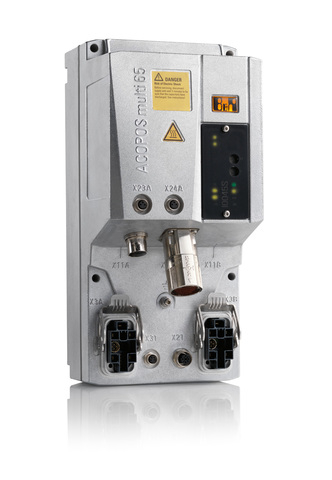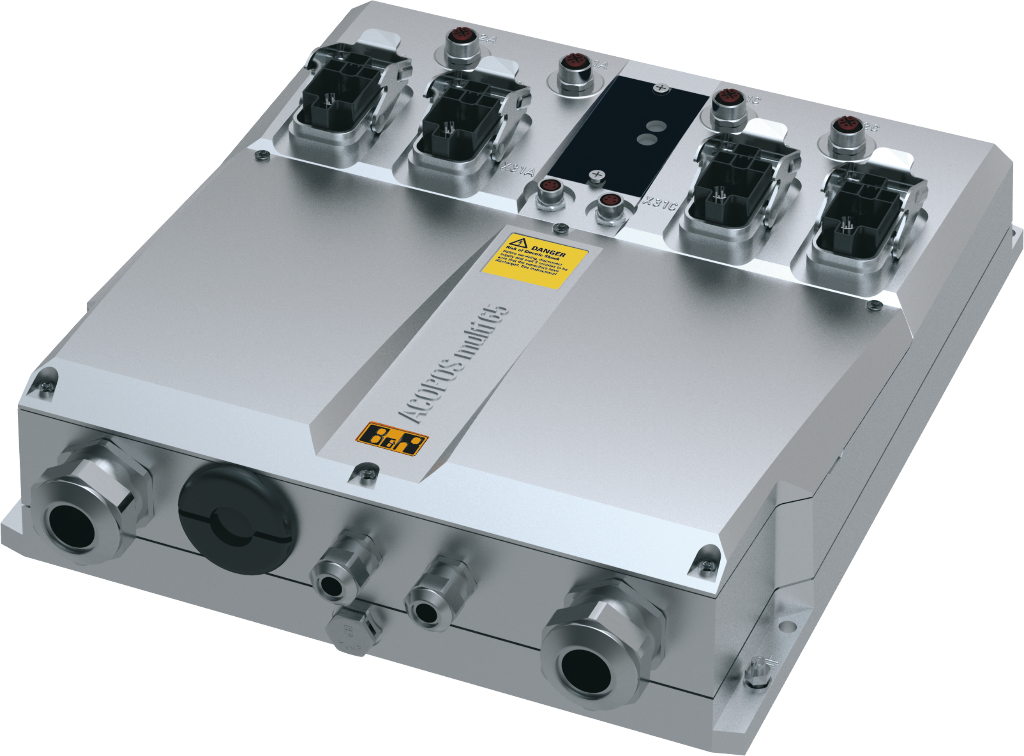
Decentralized drive system
Direct integration of drive components into the machine is the basic prerequisite for modular machine manufacturing: B&R addresses this requirement with the decentralized ACOPOSremote drive system, enabling the implementation of drive solutions that are optimally tailored to the application.
ACOPOSmulti65 inverter modules
Connection boxes
Cables
Accessories

Documentation
8CVI decentralized inverter module
Drive solutions that are optimally tailored to the application are a basic requirement for competitive machines and plants. Here, the direct integration of the inverters into the actuator's environment – without the need for additional accompanying measures – represents an ideal configuration. B&R takes this into account with the decentralized ACOPOSremote drive system. This architecture offers various advantages with regard to machine configuration.
Additional information
The ideal topology
One of the main advantages comes from hybrid cabling. Simply connecting ACOPOSremote inverter modules together in a line – the "daisy chain" wiring scheme – results in an uncomplicated and flexible machine architecture where energy is passed from one drive module to the next.
Free choice of motor
Since it is separate form the motor, users are free to choose which actuator to use for their drive solution. This type of installation is particularly well suited for the increasingly prevalent linear and torque motors. This eliminates any influence on the properties of the motor used and dynamics are maximized.
Homogeneous and compatible
The ACOPOSremote drive system offers the familiar functions of the ACOPOSmulti drive family and fits homogeneously into the drive solution.
Optimized machine and system configurations based on ACOPOSremote are the perfect complement to modular drive solutions for maximum performance and flexibility.
8CVE decentralized connection box

Standard cabling of ACOPOSremote 8CVI inverter modules is done using hybrid cables by simply stringing individual modules together in a line structure. There are high demands placed on these hybrid cables: In addition to its main tasks of supplying energy and handling network communication, other aspects such as connector technology, manageability and bend radius also need to be taken into consideration. The sum of these demands results in a practical limit to the cable diameter, which in turn limits the maximum current available to supply the ACOPOSmulti65 8CVI inverters in this line structure.
In applications where this maximum current is insufficient, the necessary power must be provided in another way, made available to a remote location on-site and then redistributed from there. This is where the 8CVE remote connection box comes in.
Robust and flexible
Like the ACOPOSremote 8CVI inverter module, the 8CVE remote connection box is designed with IP65 protection so it can be mounted directly on the machine. The robust housing makes it ideal for use in tough environments and gives the user the freedom to position the device wherever it best serves the application at hand.
Extra clearance due to separate cable routing
The separate cable routing for the power supply, 24 V supply voltage, safety technology (STO signals) and POWERLINK network allows considerably more power (up to 30 kW) to be provided decentrally using the 8CVE connection box.
Not only that, but it is also possible to use standard cables to implement alternative solutions such as transferring energy using slip rings. This provides the user with the flexibility to work with conventional connector technology while still being able to use remote servo drive technology.
Extensive connection options
The 8CVE remote connection box comes equipped with four hybrid cable outlets, which allows the power to be divided between up to four ACOPOSremote 8CVI inverter line structures.
Classic wiring solutions have also been taken into consideration. The connections necessary for the STO signals (Safe Torque Off) are also included on the 8CVE remote connection box and directly affect the ACOPOSremote 8CVI inverters connected to the hybrid cable outlets.
In addition, the 8CVE remote connection box is equipped with two local I/O connections – another example of exemplary support for modular machine concepts.